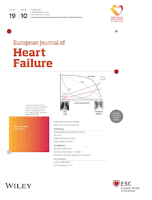
EUROPEAN JOURNAL OF HEART FAILURE
Scope & Guideline
Elevating standards in heart failure research and clinical practice.
Introduction
Aims and Scopes
- Heart Failure Mechanisms and Pathophysiology:
Research exploring the biological mechanisms underlying heart failure, including genetic, molecular, and cellular factors that contribute to disease progression. - Clinical Management and Treatment Strategies:
Studies evaluating the efficacy and safety of various treatment modalities, including pharmacological therapies, device interventions, and lifestyle changes for heart failure patients. - Epidemiology and Risk Factors:
Investigations into the prevalence, incidence, and risk factors associated with heart failure across different populations, with an emphasis on comorbidities and demographic influences. - Diagnostic Approaches:
Research focused on the development and validation of diagnostic tools and biomarkers for the early detection and accurate classification of heart failure. - Health Economics and Patient Outcomes:
Analysis of healthcare resource utilization, cost-effectiveness of treatments, and the impact of heart failure on quality of life and long-term outcomes. - Innovative Technologies:
Studies on the application of new technologies, such as telemedicine, remote monitoring, and machine learning, to enhance heart failure management and patient care.
Trending and Emerging
- Sodium-Glucose Cotransporter 2 (SGLT2) Inhibitors:
A notable increase in research surrounding SGLT2 inhibitors as a treatment option for heart failure, highlighting their multifaceted benefits beyond glycemic control. - Heart Failure with Preserved Ejection Fraction (HFpEF):
Growing attention on HFpEF, with an emphasis on understanding its unique pathophysiology, diagnostic criteria, and treatment challenges. - Telemedicine and Remote Monitoring:
Emerging themes in the utilization of telemedicine and remote monitoring technologies for managing heart failure, particularly in light of the COVID-19 pandemic. - Machine Learning and Artificial Intelligence:
Increasing integration of machine learning and AI in predicting heart failure outcomes, enhancing diagnostics, and personalizing treatment strategies. - Comorbidities and Multimorbidity:
A trend towards understanding the interplay between heart failure and other chronic conditions, focusing on comprehensive care approaches that address multiple comorbidities. - Patient-Centered Care and Quality of Life:
A shift towards research that emphasizes patient-reported outcomes, quality of life assessments, and the psychosocial aspects of living with heart failure.
Declining or Waning
- Traditional Pharmacotherapy Alone:
There seems to be a diminishing focus on studies solely centered around traditional pharmacological treatments for heart failure, with increasing interest in combination therapies and innovative approaches. - Generalized Heart Failure Definitions:
The use of broad, non-specific definitions of heart failure is becoming less prominent, as more precise phenotyping and tailored approaches are being favored in recent research. - Single-Center Studies:
The prevalence of single-center studies is declining in favor of multi-center and large cohort studies, which provide more generalizable findings and insights into heart failure management. - Basic Science without Clinical Relevance:
Research that lacks direct clinical applicability or insights into patient care is receiving less attention, as the journal increasingly prioritizes studies that bridge laboratory findings with clinical implications.
Similar Journals
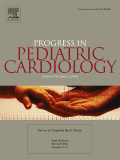
PROGRESS IN PEDIATRIC CARDIOLOGY
Elevating Standards in Pediatric Cardiovascular HealthPROGRESS IN PEDIATRIC CARDIOLOGY is a notable journal dedicated to advancing research and knowledge in the fields of pediatric cardiology and cardiovascular health in children. Published by Elsevier Ireland Ltd, this journal serves as a vital resource for clinicians, researchers, and healthcare professionals who engage with the complexities of heart diseases affecting pediatric populations. With ISSN 1058-9813 for print and 1558-1519 for online issues, it operates from Ireland and reflects a commitment to disseminating high-quality, peer-reviewed research since its inception in 1992. The journal is ranked in the Q3 category in both cardiology and pediatrics, indicating its relevance in the academic community, despite recent performance metrics showing room for growth within the competitive landscape. Researchers and practitioners can expect to find cutting-edge findings and clinical studies that aim to improve outcomes in pediatric cardiology. While it does not offer Open Access, the breadth of research covers various critical aspects, contributing significantly to the field's ongoing development.
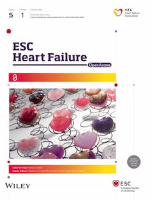
ESC Heart Failure
Bridging gaps in heart failure research and clinical application.ESC Heart Failure is a premier academic journal dedicated to the field of cardiology, specifically focusing on heart failure and its management. Published by WILEY PERIODICALS, INC, this esteemed journal has been an open access publication since 2014, making cutting-edge research readily accessible to a global audience. With its impressive impact factor and recent classification as a Q1 journal in Cardiology and Cardiovascular Medicine for 2023, ESC Heart Failure stands out as a leading resource with a Scopus ranking of #68 out of 387 in its field, placing it in the 82nd percentile. The journal aims to disseminate vital research findings, reviews, and clinical insights that advance the understanding and treatment of heart failure, thereby supporting healthcare professionals, researchers, and students in enhancing patient care. Its commitment to quality and relevance makes ESC Heart Failure an essential publication for anyone involved in cardiovascular medicine.

Cardiology Journal
Elevating standards in heart health scholarship.Cardiology Journal, published by VIA MEDICA, stands as a prominent resource in the field of cardiology and cardiovascular medicine, with an ISSN of 1897-5593 and an E-ISSN of 1898-018X. Recognized for its Open Access model established since 1994, this journal facilitates widespread dissemination of critical research findings, allowing practitioners and researchers globally to access valuable insights without barriers. Based in Poland, with an address at UL SWIETOKRZYSKA 73, 80-180 GDANSK, it has achieved a respectable Q2 classification in 2023 for both Cardiology and Miscellaneous Medicine categories, reflecting its influence and quality within the scholarly community. With a Scopus ranking placing it at #117 out of 387 in Cardiology, it lies within the 69th percentile, underpinning its commitment to advancing knowledge in cardiovascular health. The journal’s converged years extending from 2006 to 2024 ensure it captures ongoing developments in a rapidly evolving field. As such, the Cardiology Journal serves as an indispensable platform for researchers, professionals, and students dedicated to exploring the frontiers of cardiac science and improving patient care.
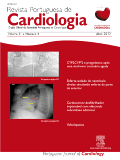
Revista Portuguesa de Cardiologia
Exploring innovative solutions in cardiology since 1970.Revista Portuguesa de Cardiologia, published by Elsevier España SLU, stands as a pivotal resource in the realm of Cardiology and Cardiovascular Medicine. With its origins tracing back to 1970, this journal has cultivated a robust academic presence, achieving a 2023 Q3 ranking in its category, and currently holding a position of #220 out of 387 on the Scopus rankings, placing it within the 43rd percentile of its field. This open access journal, available since 2011, aims to disseminate high-quality research and insights relevant to contemporary cardiovascular issues. Its commitment to accessibility and knowledge exchange enhances its importance for clinicians, researchers, and students alike, fostering a more informed community in the fight against cardiovascular diseases. Operating from its base in Barcelona, Spain, the journal welcomes contributions that further the understanding and treatment of heart conditions, contributing significantly to the advancement of cardiovascular health.

HEART FAILURE REVIEWS
Elevating Standards in Cardiac Care and ResearchHEART FAILURE REVIEWS is a premier academic journal published by Springer, dedicated to the dynamic field of cardiology and cardiovascular medicine. With an impressive Q1 ranking in 2023, the journal stands as a vital resource for researchers, clinicians, and students seeking to stay abreast of the latest developments in heart failure management and research. Covering a broad spectrum of topics, including innovative therapies, epidemiology, and pathophysiology of heart failure, it fosters an environment for interdisciplinary collaboration. The journal is indexed with an ISSN of 1382-4147 and an E-ISSN of 1573-7322, ensuring widespread dissemination of knowledge. Although it does not currently offer open access options, its rigorous peer-review process guarantees high-quality content that contributes significantly to the scientific community. Established in 1996 and running through 2024, HEART FAILURE REVIEWS continues to be a leading platform for advancing understanding and treatment of heart conditions, making it an indispensable resource for all stakeholders in cardiac health.
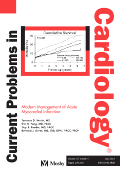
CURRENT PROBLEMS IN CARDIOLOGY
Pioneering Solutions for Modern Cardiovascular IssuesCURRENT PROBLEMS IN CARDIOLOGY is a leading peer-reviewed journal published by MOSBY-ELSEVIER, dedicated to advancing the field of cardiology through comprehensive analyses of contemporary challenges faced by cardiovascular practitioners. With its ISSN 0146-2806 and E-ISSN 1535-6280, this esteemed journal has been a crucial resource for researchers, clinicians, and students alike since its inception in 1976, and continues to publish groundbreaking studies and reviews up until 2024. As a testament to its scholarly impact, CURRENT PROBLEMS IN CARDIOLOGY boasts a prestigious Q1 ranking in both Cardiology and Cardiovascular Medicine, as well as in the broader category of Medicine (miscellaneous) in the 2023 metrics, positioning it among the top journals in its field. With a Scopus ranking of #127 out of 387 in Cardiology, and a 67th percentile ranking, it remains a vital platform for disseminating high-quality research that addresses critical issues in cardiovascular health. Researchers and practitioners looking to stay at the forefront of cardiac medicine will find this journal an indispensable tool for informed decision-making and practice improvement.

International Journal of Chronic Obstructive Pulmonary Disease
Leading the Charge Against Chronic Lung DiseaseThe International Journal of Chronic Obstructive Pulmonary Disease, published by DOVE MEDICAL PRESS LTD, serves as a premier platform for researchers and professionals involved in the study and management of COPD. Established in 2006 and transitioning to an Open Access model in 2009, this journal has quickly gained a reputable standing in various impactful categories, achieving Q1 rankings in Health Policy, Medicine (Miscellaneous), and Public Health, among others. With a focus on disseminating high-quality research, the journal is pivotal for addressing global public health challenges associated with chronic obstructive pulmonary disease. The journal's dedication to open access ensures that vital information reaches a broader audience, fostering advancements in research and clinical practice. By maintaining rigorous peer-review standards and a commitment to the advancement of understanding in COPD, the journal attracts significant contributions from scientists and practitioners worldwide, making it an invaluable resource for ongoing education and research development in this critical area.
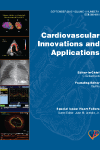
Cardiovascular Innovations and Applications
Championing open access to revolutionary cardiovascular research.Cardiovascular Innovations and Applications is a premier open-access journal dedicated to advancing knowledge in the field of cardiovascular medicine. Published by COMPUSCRIPT since 2016, this journal provides a platform for the dissemination of innovative research and applications that address crucial topics in cardiology, aiming to bridge the gap between clinical practice and cutting-edge research. With an ISSN of 2009-8618 and an E-ISSN of 2009-8782, it operates on a global scale, facilitating access to high-quality content without financial barriers. The journal is positioned within the Medicine - Cardiology and Cardiovascular Medicine category, and its current Scopus rank of #321/387 reflects its potential for growth and influence in the academic community, being in the 17th percentile. Researchers, healthcare professionals, and students will find Cardiovascular Innovations and Applications an invaluable resource in their quest for the latest findings and advancements in cardiovascular health and treatment methodologies.

IJC Heart & Vasculature
Fostering Impactful Dialogue in Heart Health ResearchIJC Heart & Vasculature is a premier open-access journal published by Elsevier Ireland Ltd, dedicated to advancing research in the fields of cardiology and cardiovascular medicine. Since its inception in 2013, this journal has established itself as a valuable resource for clinicians, researchers, and students keen on exploring the latest developments in heart and vascular health. With an impressive impact factor and ranked within Q2 in its category (2023), IJC Heart & Vasculature has achieved a significant Scopus rank of #125 out of 387, placing it in the 67th percentile of cardiology journals. The journal not only emphasizes high-quality research but also promotes innovative studies that can shape clinical practices and improve patient outcomes. Researchers and professionals can access a plethora of peer-reviewed articles, original research, and comprehensive reviews that unravel the complexities of cardiovascular science. With a commitment to fostering open and impactful dialogue in the field, IJC Heart & Vasculature is poised to be an essential platform for knowledge exchange in the evolving landscape of cardiovascular research.
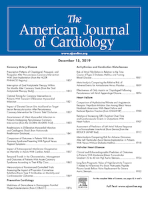
AMERICAN JOURNAL OF CARDIOLOGY
Driving Innovation in Heart Health and Clinical OutcomesThe American Journal of Cardiology is a leading peer-reviewed journal in the field of Cardiology and Cardiovascular Medicine, published by Excerpta Medica Inc-Elsevier Science Inc. Since its inception in 1958, the journal has consistently contributed to the advancement of cardiovascular research, providing a platform for groundbreaking studies and clinical findings that shape modern medical practices. With an impressive impact factor placing it in the Q1 category in its field for 2023, it ranks among the top journals in medicine, with a rank of #155 out of 387 in the Scopus database, reflecting its significance and rigorous editorial standards. The journal is committed to disseminating high-quality research that fosters innovation and enhances clinical outcomes in cardiology. Although it does not provide Open Access options, the American Journal of Cardiology remains an essential resource for researchers, healthcare professionals, and students looking to deepen their understanding of cardiovascular health.